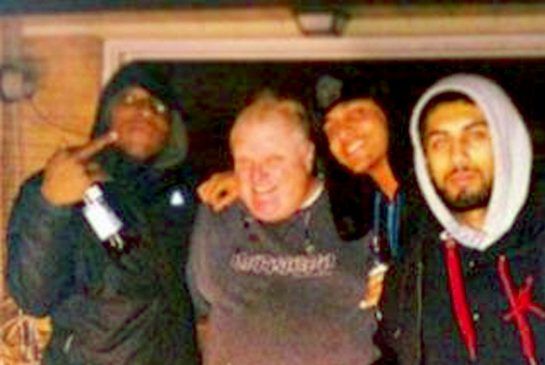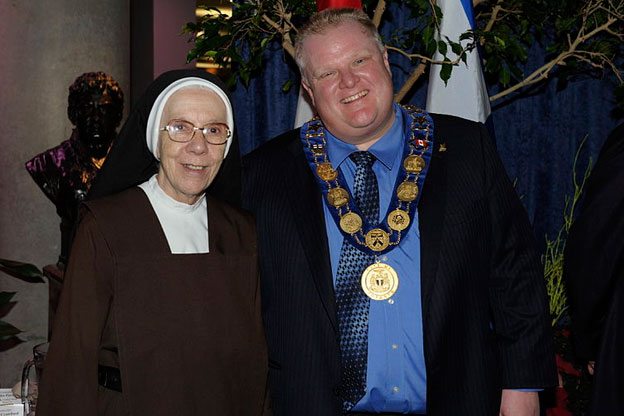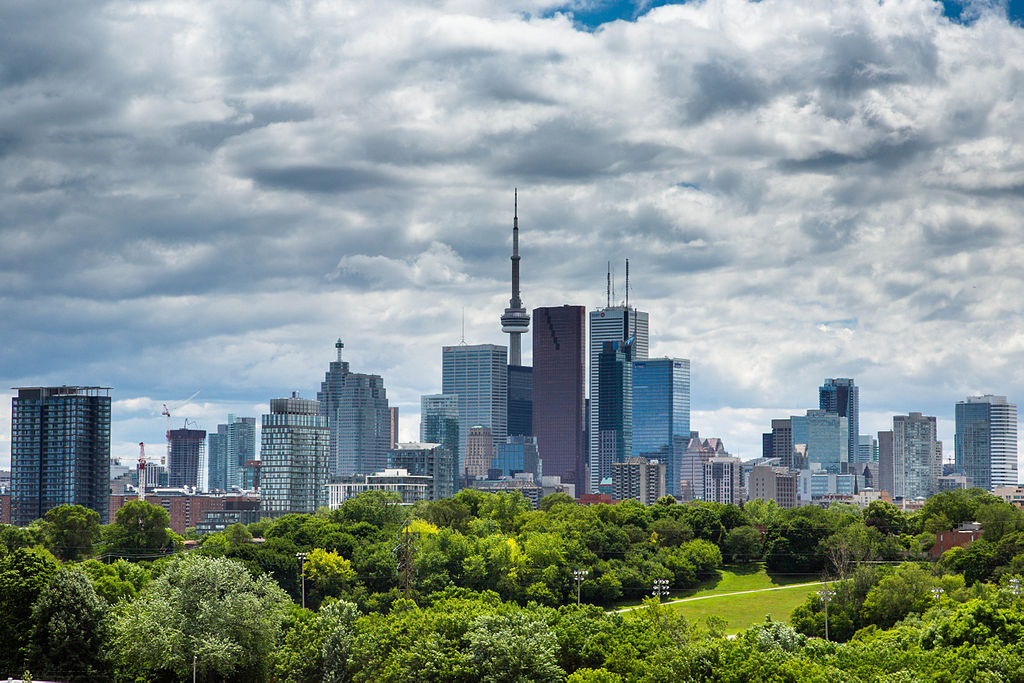
TORONTO (October, 2013) — As Rob Ford careers along his disastrous course, people the world over ask themselves, ‘What the heck is going on in Toronto?’ How could a city touted as a global model of good sense, safe streets and multiculturalism elect an unsavory buffoon like Ford as mayor? As a citizen of Toronto for most of my life, I shall attempt to respond.
First an etymological note: a few days after the events of November 18th, by which time Ford’s powers and budget had been seriously contained by city council, I dare say the coast is clearing somewhat. Bravo, city council! Consequently, I have personally chosen to restore to the city its proper name, Toronto. ‘otnorot’ — which I’ve employed for the last year or so as the Ford catastrophe gathered momentum — was chosen to suggest the backward state of our politics. I hereby set it aside. Hopefully, for good.
More disturbingly, polls released in recent days suggest that he retains significant popular approval.
A wee summary of events for international readers. Ford, a long-serving city councilperson, was elected mayor in 2010. He replaced the outgoing liberal mayor by campaigning on a tax cutting, pro-automobile campaign. His rule has been controversial all the while due to his strong views and belligerence. He withstood a conflict of interest civil suit. In May 2013, a video was shown to some members of the media that seemed to show Ford smoking crack cocaine. He denied the allegation. In the last weeks, Toronto police acknowledged the video's existence and revealed they had been investigating Ford's ties to criminals. Within days, he admitted to smoking the crack and drunk driving. He instantly became an international news phenomenon. He refuses to resign and now Toronto city council has severely limited his authority.
 Even the local right wing newspaper, The Toronto Sun, had to tell it like is was.
Even the local right wing newspaper, The Toronto Sun, had to tell it like is was.
The gong show that provided fodder to comics and found its way to international newscasts and late night American talk shows has abated for now. However, the positive developments of the past week do not mean that Ford is gone. I’m somewhat disturbed that his antics provide comic relief. There’s nothing funny about his record on public transportation and affordable housing. The fact appears to be that his core supporters are sticking with him even though city council, including the majority of his principal allies, have deserted him. He adamantly refuses to step aside, even temporarily. It would appear that unless he is charged with a criminal offence or his health fails, he will be running for re-election in October 2014. More disturbingly, polls released in recent days suggest that he retains significant popular approval. Huh? Yes, you read correctly. Rob Ford, now exposed as a serial liar, having admitted to smoking crack cocaine and driving a car under the influence of alcohol while in office, retains an approval rating of just over 40 per cent.
The great cultural theorist and scholar Northrop Frye wrote about ‘a garrison mentality’ at work in the collective Canadian psyche.
How do we make sense of this? Jerôme Lussier with l’actualité, a French language Canadian magazine, has argued that Ford presents a particular sort of political attraction. Rather than offering voters a vision of something bigger and better than themselves, Ford’s very appeal is based in his loutish, inarticulate, ill-disciplined, taunting, uncivil manner. His political essence perhaps encourages voters to subconsciously feel that their own weaknesses and their own anger at shadowy elites are OK. His banality appeals.
Ford taps a resentment of elites even though he personally is privileged. People don’t want to believe that strong man politics works, but obviously it can. In his bumptious way, Ford exhibits some of the bullying, resilient characteristics of right-wing populism that produces a Berlusconi or even Mussolini during his rise to power. Such politicians can muster enormous support and devotion among their followers. Ford is a Toronto mutation of the theme. In his 2010 campaign, Ford made false claims about the level of immigration in Toronto. He was caught in lies about previous problems with alcohol and marijuana and about a public confrontation at a professional hockey game. He won the election.

Mayor Ford: Friend of the People.
The mystery of his appeal may also lie in some other unpleasant truths about Toronto. Ford reflects powerful sentiments of anti-environmentalism. While teaching at the University of Toronto, the great cultural theorist and scholar Northrop Frye wrote about ‘a garrison mentality’ at work in the collective Canadian psyche. I suspect that the impulse remains operational in Toronto and can provide for political success. In that 2010 election, Ford campaigned overtly against the expansion of effective public transportation and improving conditions for bicyclists.
That kind of thinking that says that ‘roads are for cars and trucks’ is a winning strategy . . .
In fact, Ford’s overt campaign against above-ground public transportation is one reason for the support he continues to enjoy. Toronto is a city of car addicts. The use of public transportation is a marker of class distinction in a way it no longer is in London, Paris or New York. Even avowed environmentalists routinely use cars in the downtown area. Ford and his ilk stoke the perception that public transportation is for the poor. The message is simple: if you’re a winner, you drive a fossil fuel burning car. In this respect, Ford’s signature shiny black Cadillac Escalade sports utility vehicle means he’s not so much an exception as an exemplar of deeply held civic mores and economic ambitions.

Unlike Copenhagen or Montréal, Toronto is distinctly unfriendly to the bicyclist despite enjoying favourable weather for about eight months of the year. There is precisely one street in the downtown core with a safe dedicated bike lane. Like the solitary wind turbine just west of downtown, that lonely bike lane bears testimony to a city where environmentalism is often more marketing tool and political rhetoric than a lived experience. In that light, it’s not surprising that Rob Ford found fertile ground for his mayoral ambitions.
In addition to dismissing bicyclists as losers, Ford also made political hay in opposing a fully funded proposal for light rail transit (LRT) to Scarborough, an eastern suburb of Toronto, in favour of a subway. The plan that he quashed would have seen that LRT already under construction with a proposed completion date of 2015. The new subway plan that he championed will not be completed until at least 2023, at a much greater cost and requiring a municipal tax hike. Yet, Ford is lauded by himself and his supporters as a champion of the taxpayer’s best interest. Tellingly, he did not act alone in this subway fiasco. Council helped him reverse earlier plans. The same [Ontario] Liberal Party provincial government, that now has kept its distance from him over his personal misbehaviour, cynically supported his subway plan in order to win a by-election in the area. In 2013 in Toronto politics, that kind of thinking that says that ‘roads are for cars and trucks’ is a winning strategy - with or without Ford.
We enjoy relative multicultural harmony. The arts scene is exciting. Our streets are extraordinarily safe and peaceful by global standards.
First time visitors to the city who are flying in from abroad are often surprised to learn there is no rail link between the airport and the city. As they enter the downtown area via limousine or taxi along a crumbling elevated expressway, they will pass by, to these eyes, a rapidly expanding, hideous array of steel and glass condos and office towers that crowd the shore of Lake Ontario cutting the lake from sight of average Toronto citizens. Such developments are precisely the visible signs of supposed economic progress that fuel the politics of a Rob Ford. Garrison mentality indeed.

Toronto is a densely treed city with a growing population of bicyclists lobbying for better access on roads.
And there is a growing backlash. (Photo credit)
There is much to like about Toronto. We enjoy relative multicultural harmony. The arts scene is exciting. Our streets are extraordinarily safe and peaceful by global standards. Unlike some American cities, Toronto has many fine, diverse neighbourhoods in the downtown area. This was true before Ford’s 2010 election and remains so. What has been lost due to Ford? Meaningful progress on public transportation has been severely curtailed. A tone of civility and intelligence has been tarnished as a bullying, antagonistic style of leadership found a path to political success.
There's no question that Ford is weakened, at least for now. Even the governing federal Canadian Tories have cut bait. Employment Minister Jason Kenney, one of Prime Minister Stephen Harper's most trusted colleagues and an architect of the Conservatives’ successful wooing of voters in immigrant communities in the Toronto suburbs, asked Ford to resign. In his remarks en français, Kenney called the Ford situation "bordélique", which means extremely slovenly and inappropriate, but translates literally as 'like a bordello'. A few days earlier, Harper had released a statement that called the Ford matter "troubling”.
Ford recently told the Canadian Broadcasting Corporation that he had experienced a ‘Jesus moment’ and that voters would be presented with a new man in time for his 2014 campaign for re-election. The potential redemption of Rob Ford will focus the challenge of the true meaning and real appeal of his politics. From my vantage point, the outcome is very uncertain.

JAMES CULLINGHAM is a film maker and a professor of Journalism at Seneca College in Toronto. His most recent film, In Search of Blind Joe Death — The Saga of John Fahey, is available on DVD and currently doing the rounds in select cinemas in North America, the UK and Ireland. www.tamarackproductions.com

Comments
Filmmaker James Cullingham
Filmmaker James Cullingham drills down into the political and psychic foundations of Ford Nation’s support of its mayor’s “bordélique” behaviour. As in case of a Berlusconi, the Tea Party and even a Mussolini, all are troubling reflections of a center that is not holding and a world sorely in need of reinvention.
— Harold Crooks, posted on Facebook, Nov. 24, 2013
Add new comment